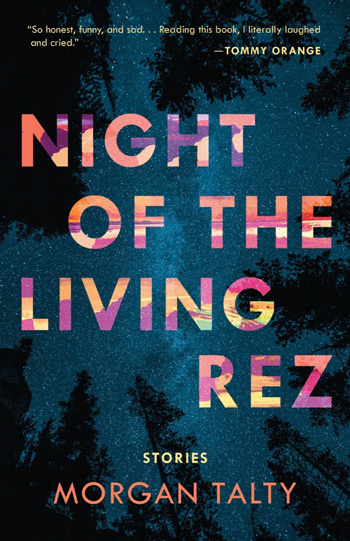Night of the Living Rez: Stories
By Morgan Talty, Tin House (2022)
Review by Tina Cohen
When I started reading Morgan Talty’s debut book, Night of the Living Rez, I saw it as a “coming of age” story, with its focus on a few teenage boys, Native American, growing up in the Penobscot Indian Nation reservation in Maine. Just like the author himself.
One of the adolescents, David, narrates the inter-related stories and so it is his perspective and experience that we come to know best through the book. But it may be that to label it a coming of age story would deny this book some of its particular power.
Often a coming of age story is about a “journey” or quest, marked by challenges and acquisition of knowledge or insight. Readers may feel optimistic when the narrator’s resilience and grit allow him to survive and surmount adversity—whether by escape, or hard-earned improvements and change, or gaining some kind of “savior” who adds support.
But the stories in Night of the Living Rez don’t lead us to that conclusion or even provide much hope that transformative events could lie ahead. If this were that kind of book, perhaps it would instead be a memoir by Talty, ending with very real achievements in his life including attending Dartmouth College and the MFA program at University of Southern Maine and becoming a successful published author.
Talty’s focus is on a community where for many, life is shaped by poverty, addiction, and family instability…
However autobiographical the life of David and his friends may be, Talty’s focus is on a community where for many, life is shaped by poverty, addiction, and family instability, full of trauma, pain, and loss. The reasons for that aren’t the point of the book. Talty immerses readers in the physicality of that reality rather than through a more detached, intellectual perspective.
For example, what’s it like to worry about a curse, a jar found filled with corn and hair and teeth. What you do when that happens, how it affects you. It’s experiential; no cultural explanation, no history lesson.

“Smokes Last” is a story I especially liked. The title, referring to cigarettes, first suggested to me their lasting (addictive) quality that recommends them compared to, say, relationships that don’t come with any such guarantees. The story centers on a night David and a friend ran an errand in the nearby town of Overtown, sharing a cigarette as they walked, one scrounged by David at home. As they pass a bar in the town, they’re accosted by someone bumming a cigarette. There’s one already in his hand, the boys point out, but he claims he’s holding it for a friend.
Whether this was true or a pretext to insult them, the man says, “Greedy f—ing Indians, can’t spare one lick of tobacco!”
At first the boys reason with the man, but with the racist insults, they reacted physically, tossing a quick volley of rocks towards the bar. Only after a running exit back to the reservation was their last cigarette shared. They’d done damage to the bar, the police ended up involved—as the boys found out later—but their evening finished on a peaceful note.
But that’s not the end of the story. Soon after, David finds in his bedroom a pack of smokes on his bureau, and a note from his mother: “Make them last.” Now the title means something else. I see it as both a request and advice from his mother, not to warn him off nicotine, but to suggest to the child pilfering her smokes that he show some respect and restraint. A lesson also relevant to the incident in town.
What if the man bumming a cigarette had shown respect? What if the boys had shown restraint? With a mother’s wish, we’re left to wonder: “Make them last” may be too much to ask, as is expecting that respect or restraint would always prevail.
I know there are myriad ways to explicate that story, and of course the rest of the book. Talty is rewarding to read in this way; he doesn’t tell you what it is you have to know or think. I heartily recommend his writing. It is gritty, disturbing, and depressing, but thoroughly compelling and thought-provoking. This is a Maine author to pay attention to.
Tina Cohen is a therapist who lives seasonally on Vinalhaven.





